Cultural Autobiography: Examining Intercultural Competence in Organizations
VerifiedAdded on 2023/06/18
|11
|2589
|386
AI Summary
This report examines intercultural competence in organizations through a questionnaire on cultural autobiography, comparison of different backgrounds, and evaluation using cultural frameworks. It covers the Hofstede Cultural Dimensions Model and concludes that self-examination is crucial for better understanding and application of intercultural competence.
Contribute Materials
Your contribution can guide someone’s learning journey. Share your
documents today.
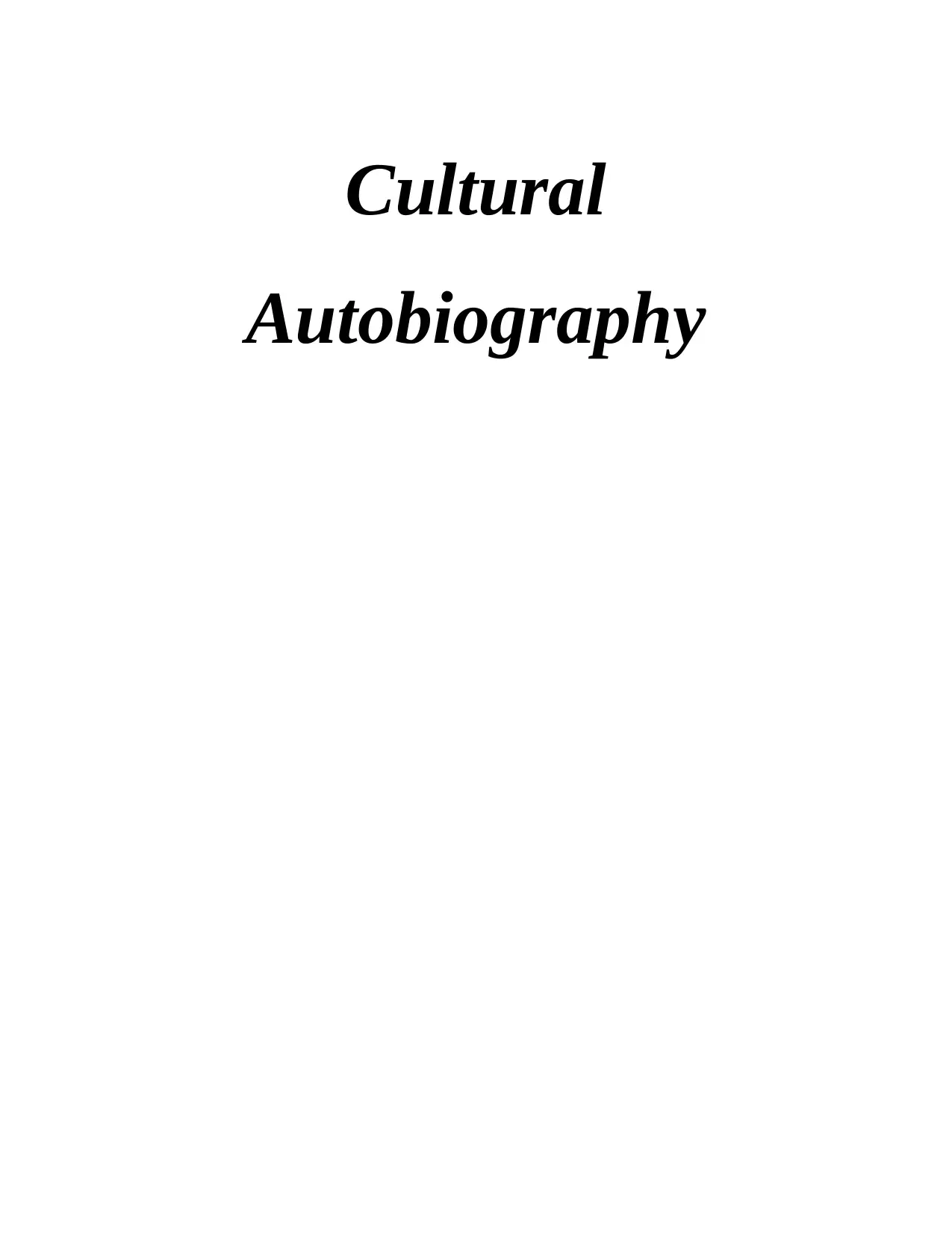
Cultural
Autobiography
Autobiography
Secure Best Marks with AI Grader
Need help grading? Try our AI Grader for instant feedback on your assignments.
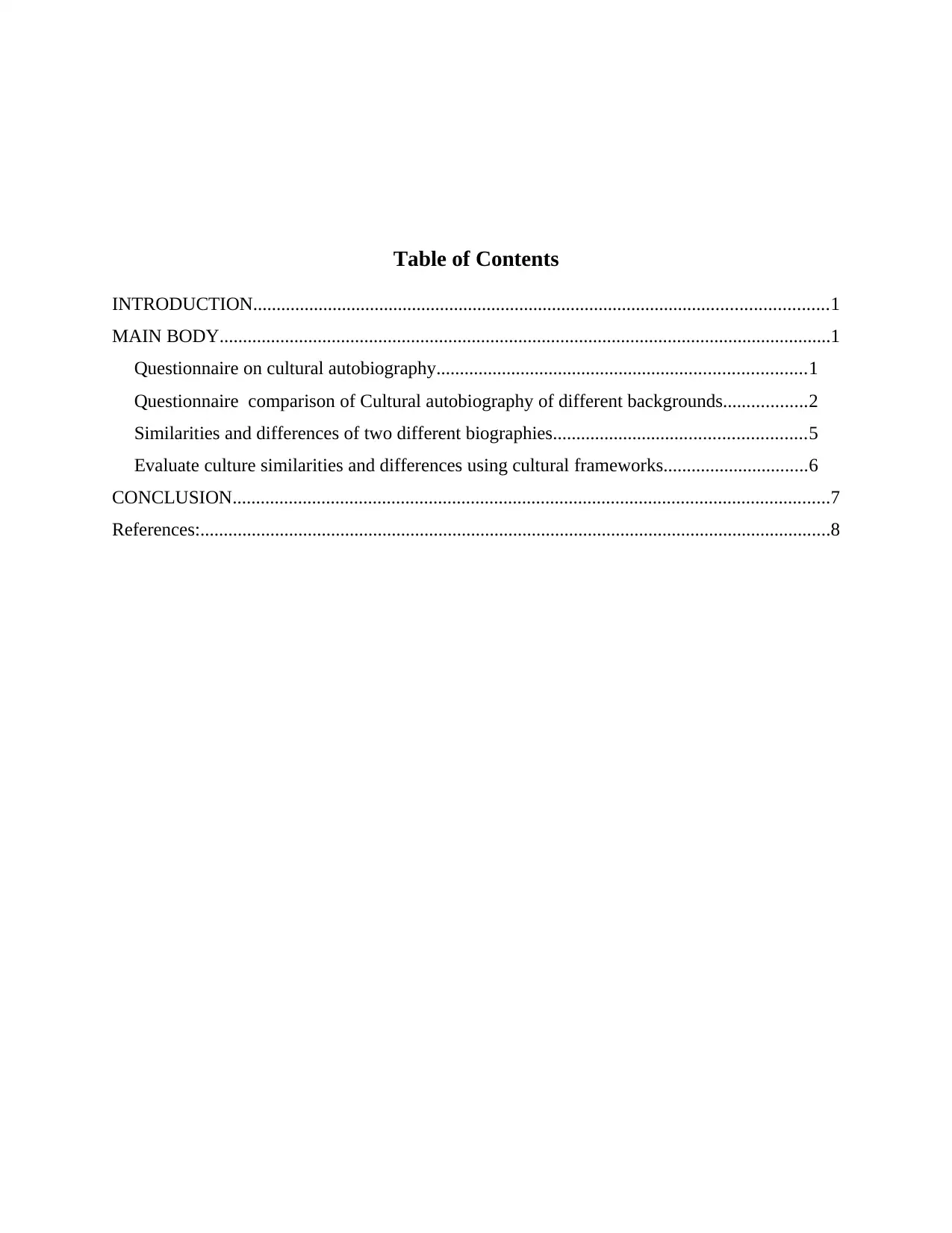
Table of Contents
INTRODUCTION...........................................................................................................................1
MAIN BODY...................................................................................................................................1
Questionnaire on cultural autobiography...............................................................................1
Questionnaire comparison of Cultural autobiography of different backgrounds..................2
Similarities and differences of two different biographies......................................................5
Evaluate culture similarities and differences using cultural frameworks...............................6
CONCLUSION................................................................................................................................7
References:.......................................................................................................................................8
INTRODUCTION...........................................................................................................................1
MAIN BODY...................................................................................................................................1
Questionnaire on cultural autobiography...............................................................................1
Questionnaire comparison of Cultural autobiography of different backgrounds..................2
Similarities and differences of two different biographies......................................................5
Evaluate culture similarities and differences using cultural frameworks...............................6
CONCLUSION................................................................................................................................7
References:.......................................................................................................................................8
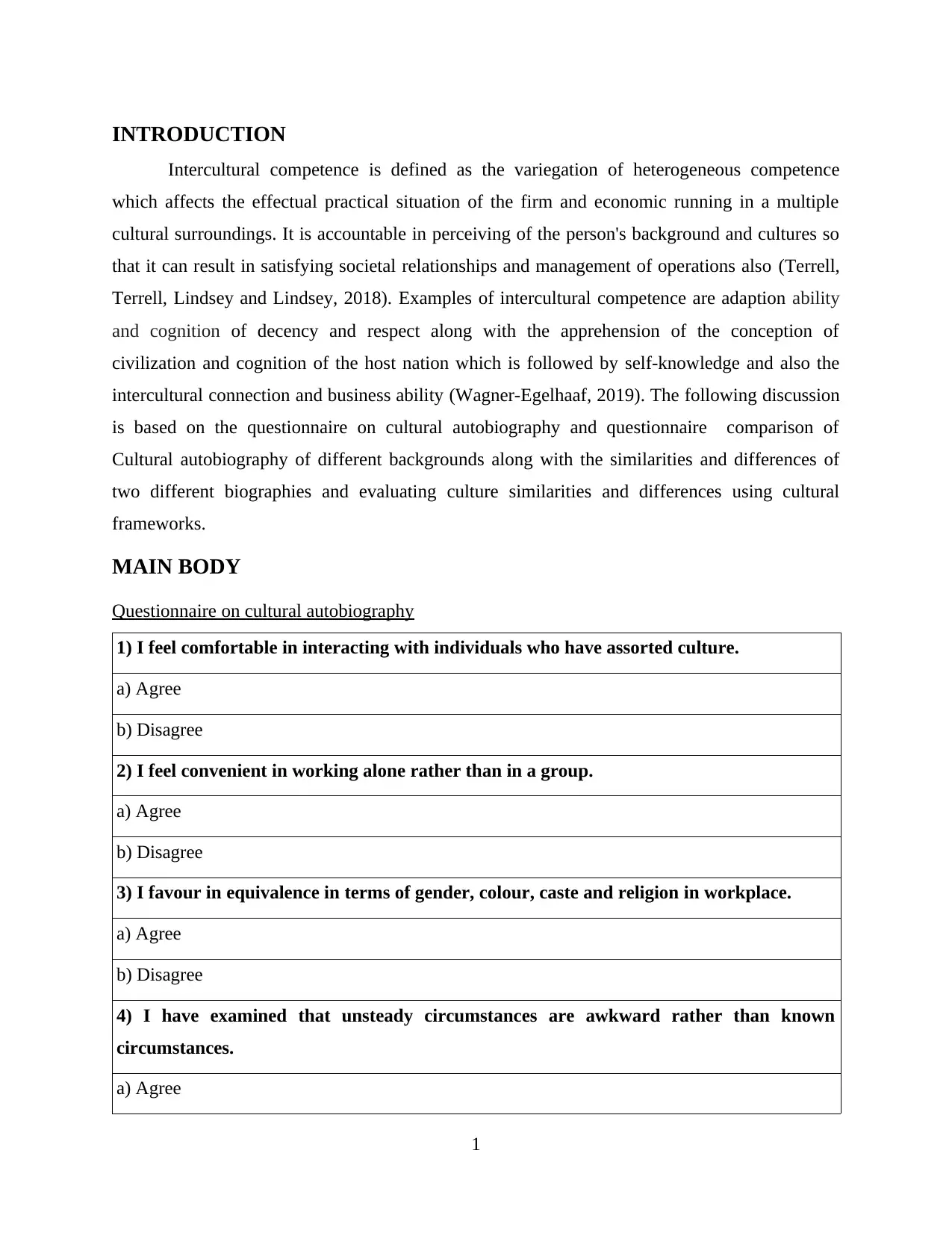
INTRODUCTION
Intercultural competence is defined as the variegation of heterogeneous competence
which affects the effectual practical situation of the firm and economic running in a multiple
cultural surroundings. It is accountable in perceiving of the person's background and cultures so
that it can result in satisfying societal relationships and management of operations also (Terrell,
Terrell, Lindsey and Lindsey, 2018). Examples of intercultural competence are adaption ability
and cognition of decency and respect along with the apprehension of the conception of
civilization and cognition of the host nation which is followed by self-knowledge and also the
intercultural connection and business ability (Wagner-Egelhaaf, 2019). The following discussion
is based on the questionnaire on cultural autobiography and questionnaire comparison of
Cultural autobiography of different backgrounds along with the similarities and differences of
two different biographies and evaluating culture similarities and differences using cultural
frameworks.
MAIN BODY
Questionnaire on cultural autobiography
1) I feel comfortable in interacting with individuals who have assorted culture.
a) Agree
b) Disagree
2) I feel convenient in working alone rather than in a group.
a) Agree
b) Disagree
3) I favour in equivalence in terms of gender, colour, caste and religion in workplace.
a) Agree
b) Disagree
4) I have examined that unsteady circumstances are awkward rather than known
circumstances.
a) Agree
1
Intercultural competence is defined as the variegation of heterogeneous competence
which affects the effectual practical situation of the firm and economic running in a multiple
cultural surroundings. It is accountable in perceiving of the person's background and cultures so
that it can result in satisfying societal relationships and management of operations also (Terrell,
Terrell, Lindsey and Lindsey, 2018). Examples of intercultural competence are adaption ability
and cognition of decency and respect along with the apprehension of the conception of
civilization and cognition of the host nation which is followed by self-knowledge and also the
intercultural connection and business ability (Wagner-Egelhaaf, 2019). The following discussion
is based on the questionnaire on cultural autobiography and questionnaire comparison of
Cultural autobiography of different backgrounds along with the similarities and differences of
two different biographies and evaluating culture similarities and differences using cultural
frameworks.
MAIN BODY
Questionnaire on cultural autobiography
1) I feel comfortable in interacting with individuals who have assorted culture.
a) Agree
b) Disagree
2) I feel convenient in working alone rather than in a group.
a) Agree
b) Disagree
3) I favour in equivalence in terms of gender, colour, caste and religion in workplace.
a) Agree
b) Disagree
4) I have examined that unsteady circumstances are awkward rather than known
circumstances.
a) Agree
1
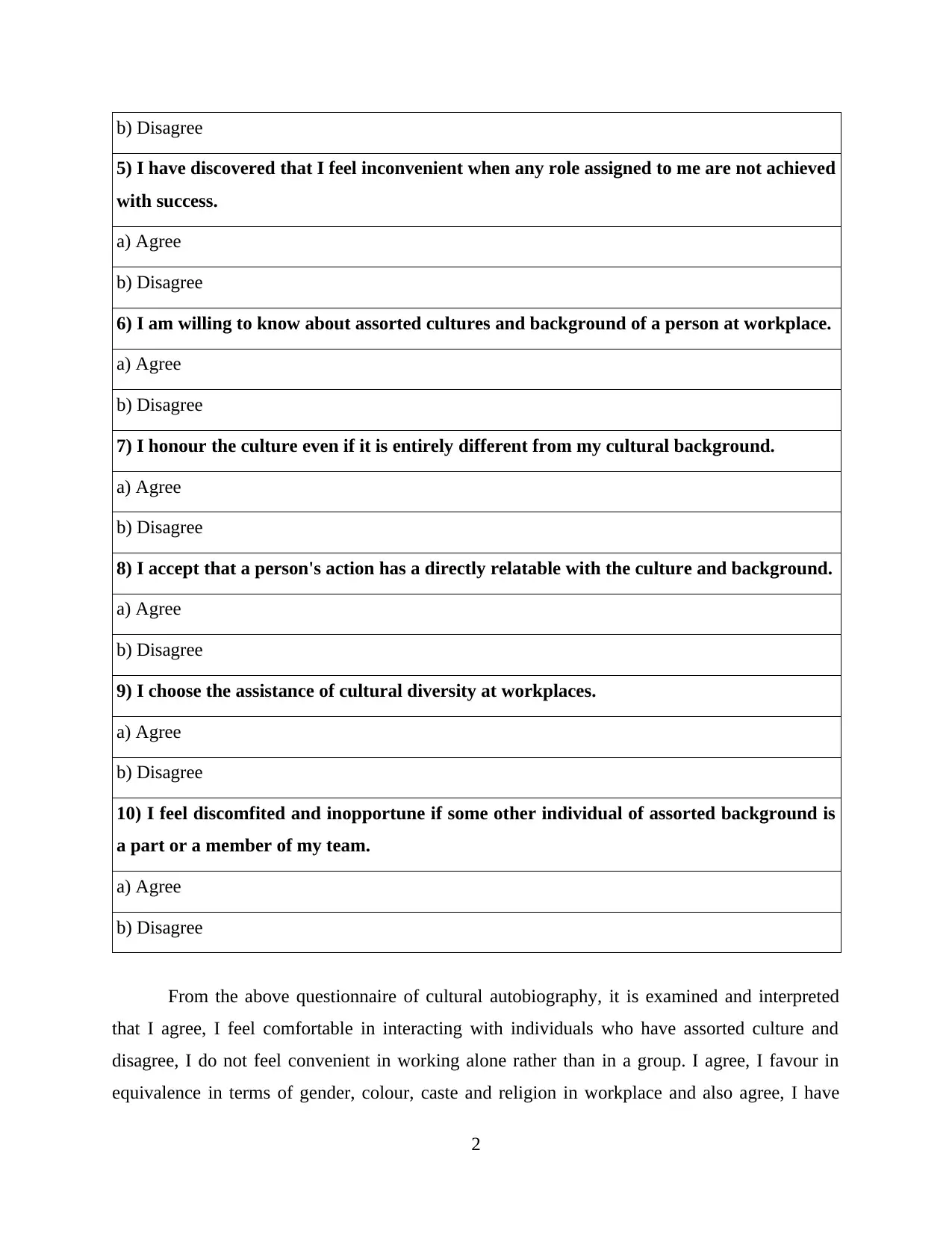
b) Disagree
5) I have discovered that I feel inconvenient when any role assigned to me are not achieved
with success.
a) Agree
b) Disagree
6) I am willing to know about assorted cultures and background of a person at workplace.
a) Agree
b) Disagree
7) I honour the culture even if it is entirely different from my cultural background.
a) Agree
b) Disagree
8) I accept that a person's action has a directly relatable with the culture and background.
a) Agree
b) Disagree
9) I choose the assistance of cultural diversity at workplaces.
a) Agree
b) Disagree
10) I feel discomfited and inopportune if some other individual of assorted background is
a part or a member of my team.
a) Agree
b) Disagree
From the above questionnaire of cultural autobiography, it is examined and interpreted
that I agree, I feel comfortable in interacting with individuals who have assorted culture and
disagree, I do not feel convenient in working alone rather than in a group. I agree, I favour in
equivalence in terms of gender, colour, caste and religion in workplace and also agree, I have
2
5) I have discovered that I feel inconvenient when any role assigned to me are not achieved
with success.
a) Agree
b) Disagree
6) I am willing to know about assorted cultures and background of a person at workplace.
a) Agree
b) Disagree
7) I honour the culture even if it is entirely different from my cultural background.
a) Agree
b) Disagree
8) I accept that a person's action has a directly relatable with the culture and background.
a) Agree
b) Disagree
9) I choose the assistance of cultural diversity at workplaces.
a) Agree
b) Disagree
10) I feel discomfited and inopportune if some other individual of assorted background is
a part or a member of my team.
a) Agree
b) Disagree
From the above questionnaire of cultural autobiography, it is examined and interpreted
that I agree, I feel comfortable in interacting with individuals who have assorted culture and
disagree, I do not feel convenient in working alone rather than in a group. I agree, I favour in
equivalence in terms of gender, colour, caste and religion in workplace and also agree, I have
2
Secure Best Marks with AI Grader
Need help grading? Try our AI Grader for instant feedback on your assignments.
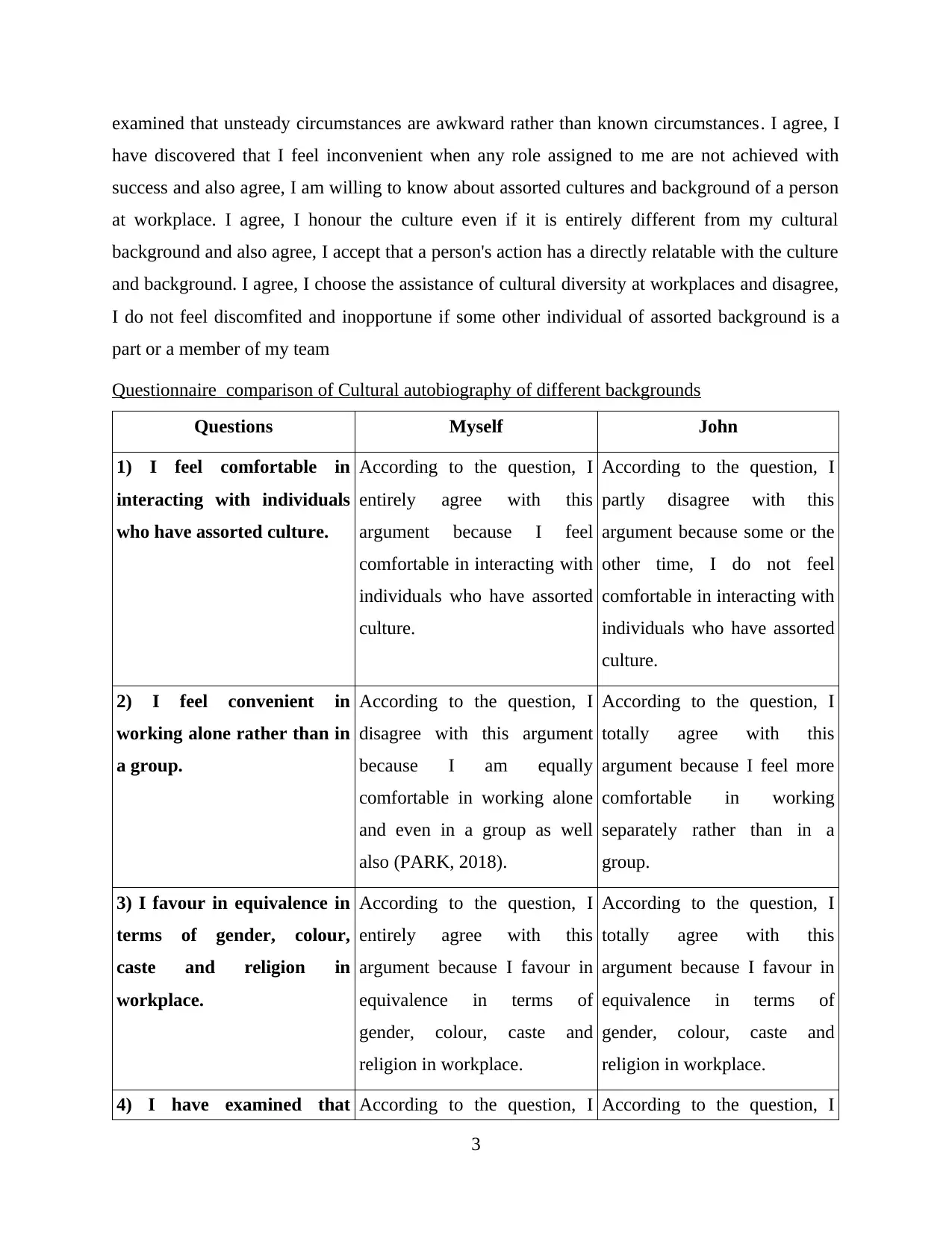
examined that unsteady circumstances are awkward rather than known circumstances. I agree, I
have discovered that I feel inconvenient when any role assigned to me are not achieved with
success and also agree, I am willing to know about assorted cultures and background of a person
at workplace. I agree, I honour the culture even if it is entirely different from my cultural
background and also agree, I accept that a person's action has a directly relatable with the culture
and background. I agree, I choose the assistance of cultural diversity at workplaces and disagree,
I do not feel discomfited and inopportune if some other individual of assorted background is a
part or a member of my team
Questionnaire comparison of Cultural autobiography of different backgrounds
Questions Myself John
1) I feel comfortable in
interacting with individuals
who have assorted culture.
According to the question, I
entirely agree with this
argument because I feel
comfortable in interacting with
individuals who have assorted
culture.
According to the question, I
partly disagree with this
argument because some or the
other time, I do not feel
comfortable in interacting with
individuals who have assorted
culture.
2) I feel convenient in
working alone rather than in
a group.
According to the question, I
disagree with this argument
because I am equally
comfortable in working alone
and even in a group as well
also (PARK, 2018).
According to the question, I
totally agree with this
argument because I feel more
comfortable in working
separately rather than in a
group.
3) I favour in equivalence in
terms of gender, colour,
caste and religion in
workplace.
According to the question, I
entirely agree with this
argument because I favour in
equivalence in terms of
gender, colour, caste and
religion in workplace.
According to the question, I
totally agree with this
argument because I favour in
equivalence in terms of
gender, colour, caste and
religion in workplace.
4) I have examined that According to the question, I According to the question, I
3
have discovered that I feel inconvenient when any role assigned to me are not achieved with
success and also agree, I am willing to know about assorted cultures and background of a person
at workplace. I agree, I honour the culture even if it is entirely different from my cultural
background and also agree, I accept that a person's action has a directly relatable with the culture
and background. I agree, I choose the assistance of cultural diversity at workplaces and disagree,
I do not feel discomfited and inopportune if some other individual of assorted background is a
part or a member of my team
Questionnaire comparison of Cultural autobiography of different backgrounds
Questions Myself John
1) I feel comfortable in
interacting with individuals
who have assorted culture.
According to the question, I
entirely agree with this
argument because I feel
comfortable in interacting with
individuals who have assorted
culture.
According to the question, I
partly disagree with this
argument because some or the
other time, I do not feel
comfortable in interacting with
individuals who have assorted
culture.
2) I feel convenient in
working alone rather than in
a group.
According to the question, I
disagree with this argument
because I am equally
comfortable in working alone
and even in a group as well
also (PARK, 2018).
According to the question, I
totally agree with this
argument because I feel more
comfortable in working
separately rather than in a
group.
3) I favour in equivalence in
terms of gender, colour,
caste and religion in
workplace.
According to the question, I
entirely agree with this
argument because I favour in
equivalence in terms of
gender, colour, caste and
religion in workplace.
According to the question, I
totally agree with this
argument because I favour in
equivalence in terms of
gender, colour, caste and
religion in workplace.
4) I have examined that According to the question, I According to the question, I
3
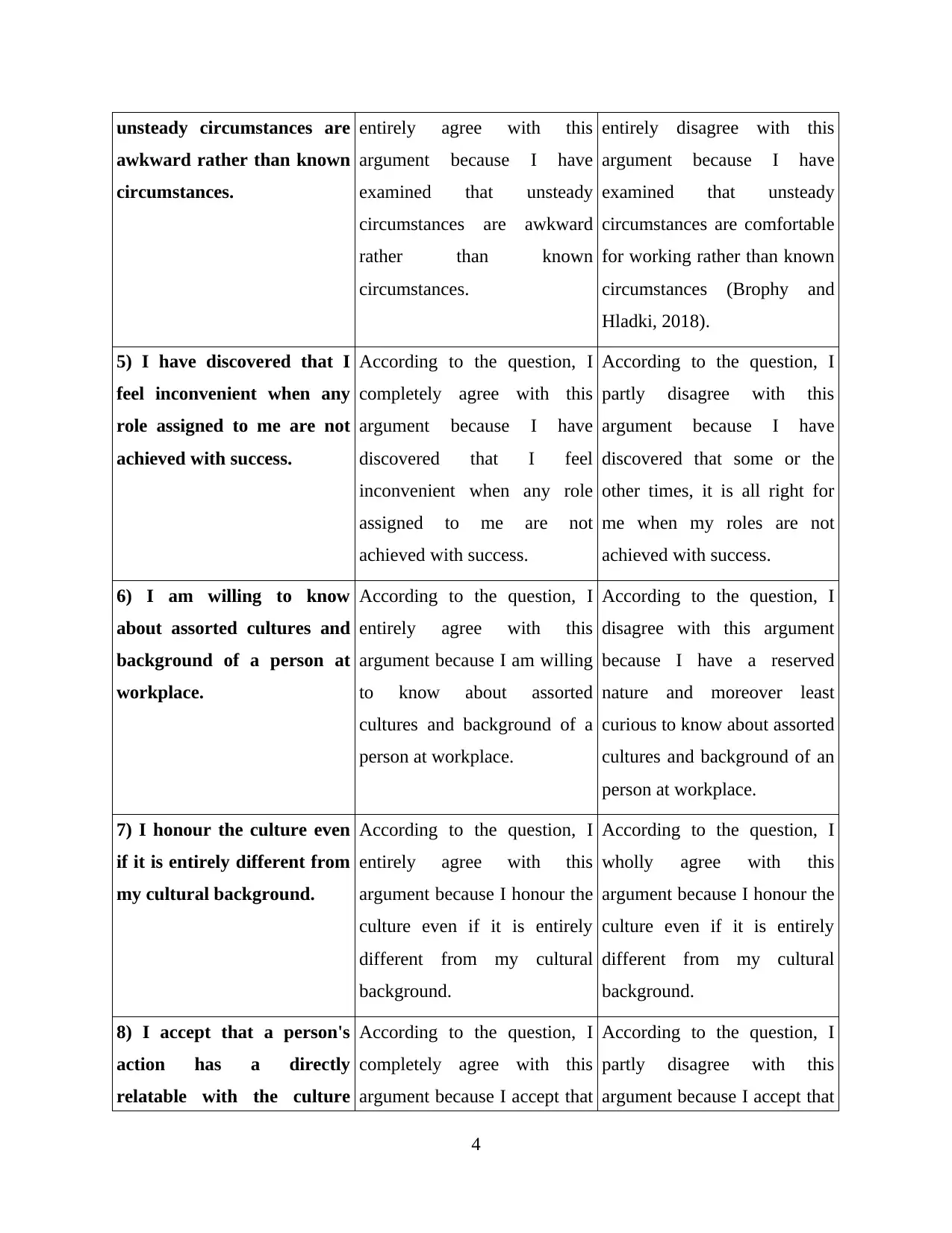
unsteady circumstances are
awkward rather than known
circumstances.
entirely agree with this
argument because I have
examined that unsteady
circumstances are awkward
rather than known
circumstances.
entirely disagree with this
argument because I have
examined that unsteady
circumstances are comfortable
for working rather than known
circumstances (Brophy and
Hladki, 2018).
5) I have discovered that I
feel inconvenient when any
role assigned to me are not
achieved with success.
According to the question, I
completely agree with this
argument because I have
discovered that I feel
inconvenient when any role
assigned to me are not
achieved with success.
According to the question, I
partly disagree with this
argument because I have
discovered that some or the
other times, it is all right for
me when my roles are not
achieved with success.
6) I am willing to know
about assorted cultures and
background of a person at
workplace.
According to the question, I
entirely agree with this
argument because I am willing
to know about assorted
cultures and background of a
person at workplace.
According to the question, I
disagree with this argument
because I have a reserved
nature and moreover least
curious to know about assorted
cultures and background of an
person at workplace.
7) I honour the culture even
if it is entirely different from
my cultural background.
According to the question, I
entirely agree with this
argument because I honour the
culture even if it is entirely
different from my cultural
background.
According to the question, I
wholly agree with this
argument because I honour the
culture even if it is entirely
different from my cultural
background.
8) I accept that a person's
action has a directly
relatable with the culture
According to the question, I
completely agree with this
argument because I accept that
According to the question, I
partly disagree with this
argument because I accept that
4
awkward rather than known
circumstances.
entirely agree with this
argument because I have
examined that unsteady
circumstances are awkward
rather than known
circumstances.
entirely disagree with this
argument because I have
examined that unsteady
circumstances are comfortable
for working rather than known
circumstances (Brophy and
Hladki, 2018).
5) I have discovered that I
feel inconvenient when any
role assigned to me are not
achieved with success.
According to the question, I
completely agree with this
argument because I have
discovered that I feel
inconvenient when any role
assigned to me are not
achieved with success.
According to the question, I
partly disagree with this
argument because I have
discovered that some or the
other times, it is all right for
me when my roles are not
achieved with success.
6) I am willing to know
about assorted cultures and
background of a person at
workplace.
According to the question, I
entirely agree with this
argument because I am willing
to know about assorted
cultures and background of a
person at workplace.
According to the question, I
disagree with this argument
because I have a reserved
nature and moreover least
curious to know about assorted
cultures and background of an
person at workplace.
7) I honour the culture even
if it is entirely different from
my cultural background.
According to the question, I
entirely agree with this
argument because I honour the
culture even if it is entirely
different from my cultural
background.
According to the question, I
wholly agree with this
argument because I honour the
culture even if it is entirely
different from my cultural
background.
8) I accept that a person's
action has a directly
relatable with the culture
According to the question, I
completely agree with this
argument because I accept that
According to the question, I
partly disagree with this
argument because I accept that
4
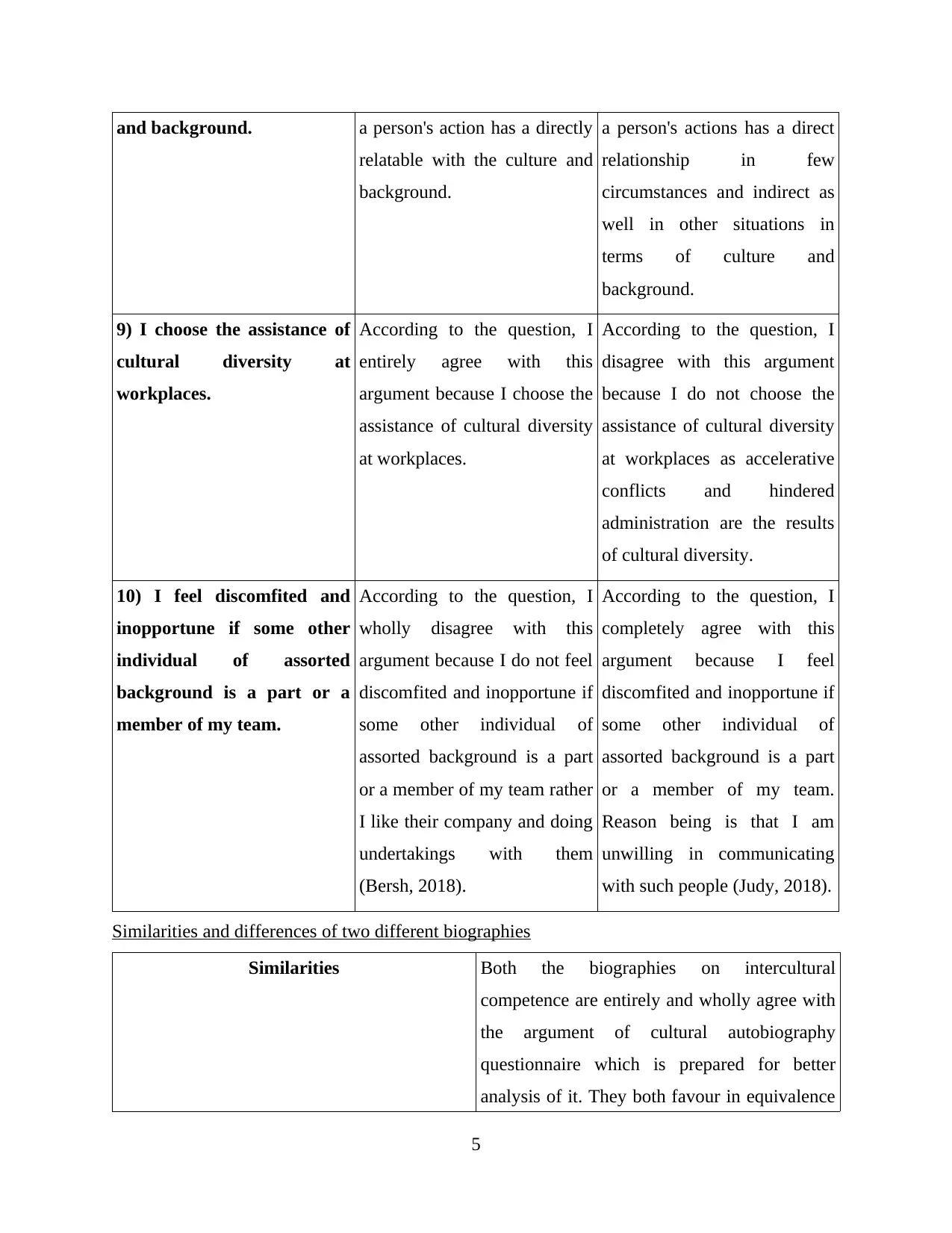
and background. a person's action has a directly
relatable with the culture and
background.
a person's actions has a direct
relationship in few
circumstances and indirect as
well in other situations in
terms of culture and
background.
9) I choose the assistance of
cultural diversity at
workplaces.
According to the question, I
entirely agree with this
argument because I choose the
assistance of cultural diversity
at workplaces.
According to the question, I
disagree with this argument
because I do not choose the
assistance of cultural diversity
at workplaces as accelerative
conflicts and hindered
administration are the results
of cultural diversity.
10) I feel discomfited and
inopportune if some other
individual of assorted
background is a part or a
member of my team.
According to the question, I
wholly disagree with this
argument because I do not feel
discomfited and inopportune if
some other individual of
assorted background is a part
or a member of my team rather
I like their company and doing
undertakings with them
(Bersh, 2018).
According to the question, I
completely agree with this
argument because I feel
discomfited and inopportune if
some other individual of
assorted background is a part
or a member of my team.
Reason being is that I am
unwilling in communicating
with such people (Judy, 2018).
Similarities and differences of two different biographies
Similarities Both the biographies on intercultural
competence are entirely and wholly agree with
the argument of cultural autobiography
questionnaire which is prepared for better
analysis of it. They both favour in equivalence
5
relatable with the culture and
background.
a person's actions has a direct
relationship in few
circumstances and indirect as
well in other situations in
terms of culture and
background.
9) I choose the assistance of
cultural diversity at
workplaces.
According to the question, I
entirely agree with this
argument because I choose the
assistance of cultural diversity
at workplaces.
According to the question, I
disagree with this argument
because I do not choose the
assistance of cultural diversity
at workplaces as accelerative
conflicts and hindered
administration are the results
of cultural diversity.
10) I feel discomfited and
inopportune if some other
individual of assorted
background is a part or a
member of my team.
According to the question, I
wholly disagree with this
argument because I do not feel
discomfited and inopportune if
some other individual of
assorted background is a part
or a member of my team rather
I like their company and doing
undertakings with them
(Bersh, 2018).
According to the question, I
completely agree with this
argument because I feel
discomfited and inopportune if
some other individual of
assorted background is a part
or a member of my team.
Reason being is that I am
unwilling in communicating
with such people (Judy, 2018).
Similarities and differences of two different biographies
Similarities Both the biographies on intercultural
competence are entirely and wholly agree with
the argument of cultural autobiography
questionnaire which is prepared for better
analysis of it. They both favour in equivalence
5
Paraphrase This Document
Need a fresh take? Get an instant paraphrase of this document with our AI Paraphraser
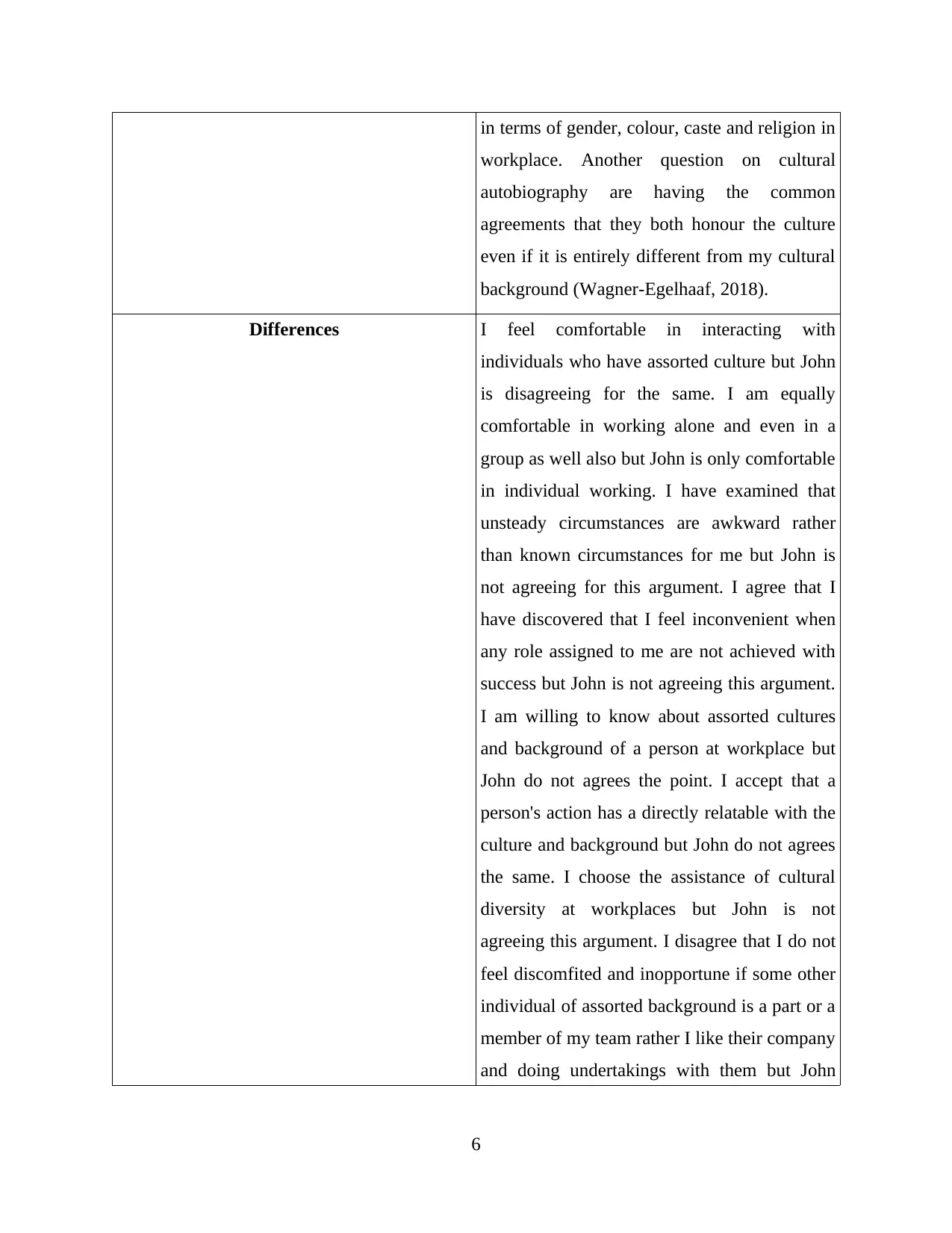
in terms of gender, colour, caste and religion in
workplace. Another question on cultural
autobiography are having the common
agreements that they both honour the culture
even if it is entirely different from my cultural
background (Wagner-Egelhaaf, 2018).
Differences I feel comfortable in interacting with
individuals who have assorted culture but John
is disagreeing for the same. I am equally
comfortable in working alone and even in a
group as well also but John is only comfortable
in individual working. I have examined that
unsteady circumstances are awkward rather
than known circumstances for me but John is
not agreeing for this argument. I agree that I
have discovered that I feel inconvenient when
any role assigned to me are not achieved with
success but John is not agreeing this argument.
I am willing to know about assorted cultures
and background of a person at workplace but
John do not agrees the point. I accept that a
person's action has a directly relatable with the
culture and background but John do not agrees
the same. I choose the assistance of cultural
diversity at workplaces but John is not
agreeing this argument. I disagree that I do not
feel discomfited and inopportune if some other
individual of assorted background is a part or a
member of my team rather I like their company
and doing undertakings with them but John
6
workplace. Another question on cultural
autobiography are having the common
agreements that they both honour the culture
even if it is entirely different from my cultural
background (Wagner-Egelhaaf, 2018).
Differences I feel comfortable in interacting with
individuals who have assorted culture but John
is disagreeing for the same. I am equally
comfortable in working alone and even in a
group as well also but John is only comfortable
in individual working. I have examined that
unsteady circumstances are awkward rather
than known circumstances for me but John is
not agreeing for this argument. I agree that I
have discovered that I feel inconvenient when
any role assigned to me are not achieved with
success but John is not agreeing this argument.
I am willing to know about assorted cultures
and background of a person at workplace but
John do not agrees the point. I accept that a
person's action has a directly relatable with the
culture and background but John do not agrees
the same. I choose the assistance of cultural
diversity at workplaces but John is not
agreeing this argument. I disagree that I do not
feel discomfited and inopportune if some other
individual of assorted background is a part or a
member of my team rather I like their company
and doing undertakings with them but John
6
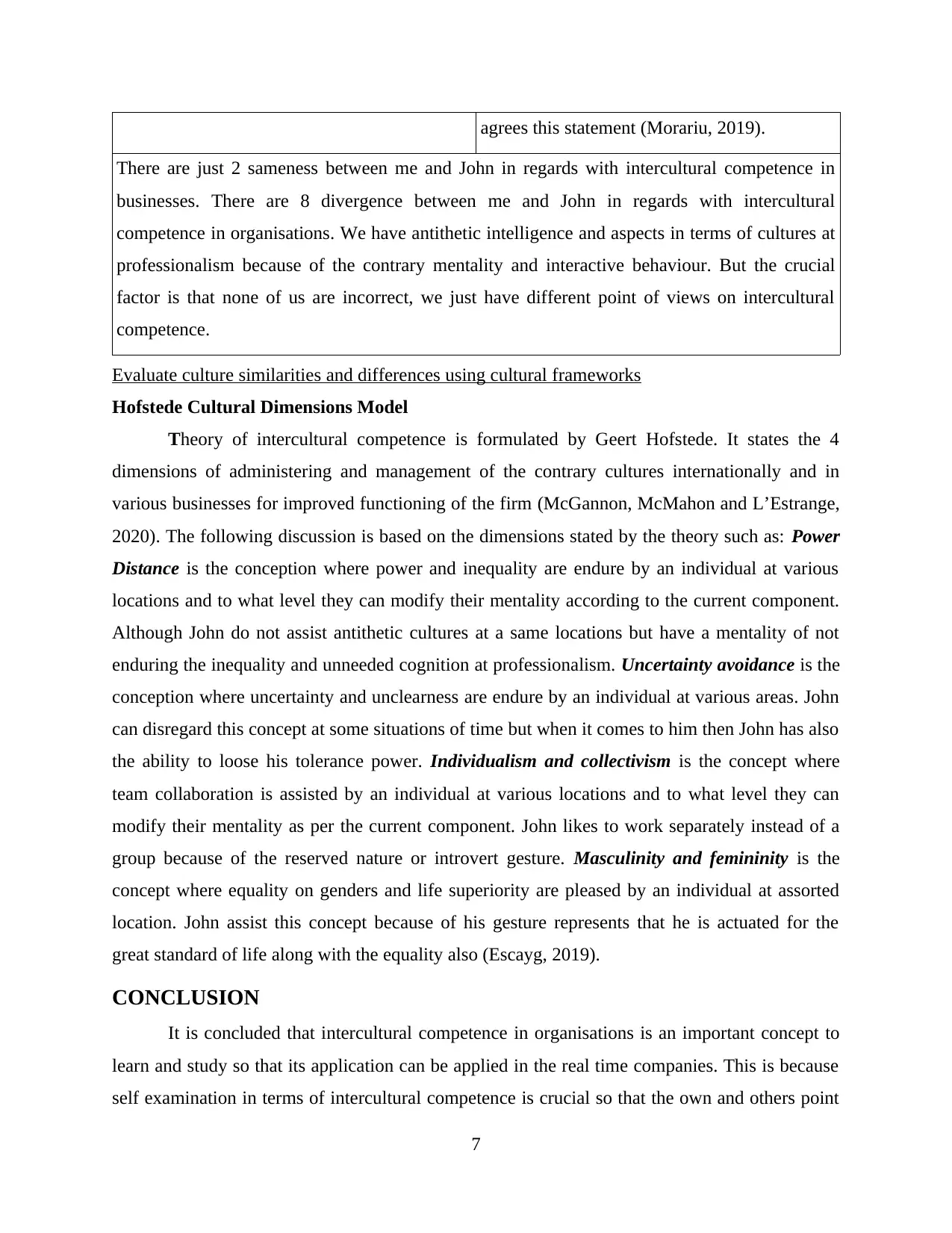
agrees this statement (Morariu, 2019).
There are just 2 sameness between me and John in regards with intercultural competence in
businesses. There are 8 divergence between me and John in regards with intercultural
competence in organisations. We have antithetic intelligence and aspects in terms of cultures at
professionalism because of the contrary mentality and interactive behaviour. But the crucial
factor is that none of us are incorrect, we just have different point of views on intercultural
competence.
Evaluate culture similarities and differences using cultural frameworks
Hofstede Cultural Dimensions Model
Theory of intercultural competence is formulated by Geert Hofstede. It states the 4
dimensions of administering and management of the contrary cultures internationally and in
various businesses for improved functioning of the firm (McGannon, McMahon and L’Estrange,
2020). The following discussion is based on the dimensions stated by the theory such as: Power
Distance is the conception where power and inequality are endure by an individual at various
locations and to what level they can modify their mentality according to the current component.
Although John do not assist antithetic cultures at a same locations but have a mentality of not
enduring the inequality and unneeded cognition at professionalism. Uncertainty avoidance is the
conception where uncertainty and unclearness are endure by an individual at various areas. John
can disregard this concept at some situations of time but when it comes to him then John has also
the ability to loose his tolerance power. Individualism and collectivism is the concept where
team collaboration is assisted by an individual at various locations and to what level they can
modify their mentality as per the current component. John likes to work separately instead of a
group because of the reserved nature or introvert gesture. Masculinity and femininity is the
concept where equality on genders and life superiority are pleased by an individual at assorted
location. John assist this concept because of his gesture represents that he is actuated for the
great standard of life along with the equality also (Escayg, 2019).
CONCLUSION
It is concluded that intercultural competence in organisations is an important concept to
learn and study so that its application can be applied in the real time companies. This is because
self examination in terms of intercultural competence is crucial so that the own and others point
7
There are just 2 sameness between me and John in regards with intercultural competence in
businesses. There are 8 divergence between me and John in regards with intercultural
competence in organisations. We have antithetic intelligence and aspects in terms of cultures at
professionalism because of the contrary mentality and interactive behaviour. But the crucial
factor is that none of us are incorrect, we just have different point of views on intercultural
competence.
Evaluate culture similarities and differences using cultural frameworks
Hofstede Cultural Dimensions Model
Theory of intercultural competence is formulated by Geert Hofstede. It states the 4
dimensions of administering and management of the contrary cultures internationally and in
various businesses for improved functioning of the firm (McGannon, McMahon and L’Estrange,
2020). The following discussion is based on the dimensions stated by the theory such as: Power
Distance is the conception where power and inequality are endure by an individual at various
locations and to what level they can modify their mentality according to the current component.
Although John do not assist antithetic cultures at a same locations but have a mentality of not
enduring the inequality and unneeded cognition at professionalism. Uncertainty avoidance is the
conception where uncertainty and unclearness are endure by an individual at various areas. John
can disregard this concept at some situations of time but when it comes to him then John has also
the ability to loose his tolerance power. Individualism and collectivism is the concept where
team collaboration is assisted by an individual at various locations and to what level they can
modify their mentality as per the current component. John likes to work separately instead of a
group because of the reserved nature or introvert gesture. Masculinity and femininity is the
concept where equality on genders and life superiority are pleased by an individual at assorted
location. John assist this concept because of his gesture represents that he is actuated for the
great standard of life along with the equality also (Escayg, 2019).
CONCLUSION
It is concluded that intercultural competence in organisations is an important concept to
learn and study so that its application can be applied in the real time companies. This is because
self examination in terms of intercultural competence is crucial so that the own and others point
7
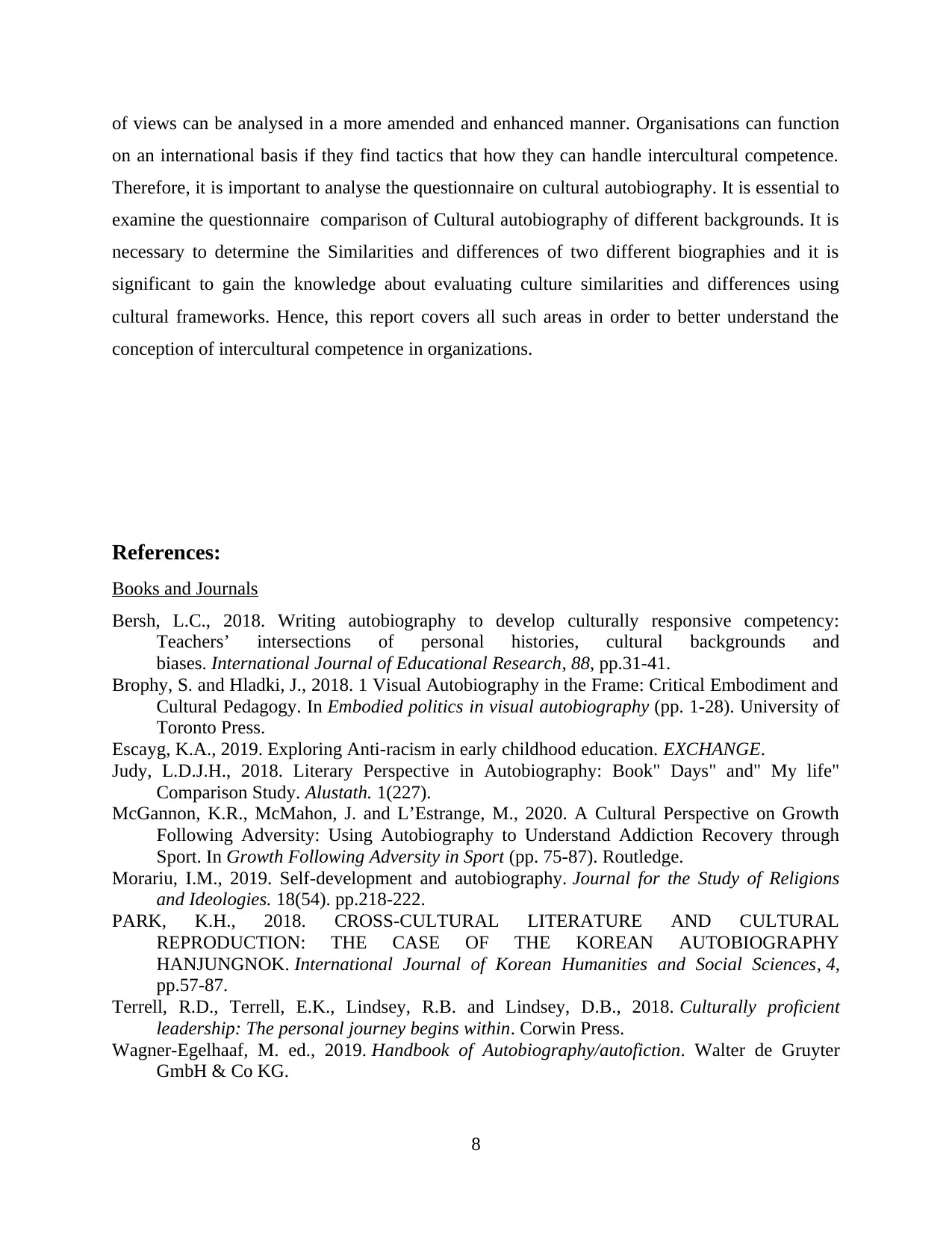
of views can be analysed in a more amended and enhanced manner. Organisations can function
on an international basis if they find tactics that how they can handle intercultural competence.
Therefore, it is important to analyse the questionnaire on cultural autobiography. It is essential to
examine the questionnaire comparison of Cultural autobiography of different backgrounds. It is
necessary to determine the Similarities and differences of two different biographies and it is
significant to gain the knowledge about evaluating culture similarities and differences using
cultural frameworks. Hence, this report covers all such areas in order to better understand the
conception of intercultural competence in organizations.
References:
Books and Journals
Bersh, L.C., 2018. Writing autobiography to develop culturally responsive competency:
Teachers’ intersections of personal histories, cultural backgrounds and
biases. International Journal of Educational Research, 88, pp.31-41.
Brophy, S. and Hladki, J., 2018. 1 Visual Autobiography in the Frame: Critical Embodiment and
Cultural Pedagogy. In Embodied politics in visual autobiography (pp. 1-28). University of
Toronto Press.
Escayg, K.A., 2019. Exploring Anti-racism in early childhood education. EXCHANGE.
Judy, L.D.J.H., 2018. Literary Perspective in Autobiography: Book" Days" and" My life"
Comparison Study. Alustath. 1(227).
McGannon, K.R., McMahon, J. and L’Estrange, M., 2020. A Cultural Perspective on Growth
Following Adversity: Using Autobiography to Understand Addiction Recovery through
Sport. In Growth Following Adversity in Sport (pp. 75-87). Routledge.
Morariu, I.M., 2019. Self-development and autobiography. Journal for the Study of Religions
and Ideologies. 18(54). pp.218-222.
PARK, K.H., 2018. CROSS-CULTURAL LITERATURE AND CULTURAL
REPRODUCTION: THE CASE OF THE KOREAN AUTOBIOGRAPHY
HANJUNGNOK. International Journal of Korean Humanities and Social Sciences, 4,
pp.57-87.
Terrell, R.D., Terrell, E.K., Lindsey, R.B. and Lindsey, D.B., 2018. Culturally proficient
leadership: The personal journey begins within. Corwin Press.
Wagner-Egelhaaf, M. ed., 2019. Handbook of Autobiography/autofiction. Walter de Gruyter
GmbH & Co KG.
8
on an international basis if they find tactics that how they can handle intercultural competence.
Therefore, it is important to analyse the questionnaire on cultural autobiography. It is essential to
examine the questionnaire comparison of Cultural autobiography of different backgrounds. It is
necessary to determine the Similarities and differences of two different biographies and it is
significant to gain the knowledge about evaluating culture similarities and differences using
cultural frameworks. Hence, this report covers all such areas in order to better understand the
conception of intercultural competence in organizations.
References:
Books and Journals
Bersh, L.C., 2018. Writing autobiography to develop culturally responsive competency:
Teachers’ intersections of personal histories, cultural backgrounds and
biases. International Journal of Educational Research, 88, pp.31-41.
Brophy, S. and Hladki, J., 2018. 1 Visual Autobiography in the Frame: Critical Embodiment and
Cultural Pedagogy. In Embodied politics in visual autobiography (pp. 1-28). University of
Toronto Press.
Escayg, K.A., 2019. Exploring Anti-racism in early childhood education. EXCHANGE.
Judy, L.D.J.H., 2018. Literary Perspective in Autobiography: Book" Days" and" My life"
Comparison Study. Alustath. 1(227).
McGannon, K.R., McMahon, J. and L’Estrange, M., 2020. A Cultural Perspective on Growth
Following Adversity: Using Autobiography to Understand Addiction Recovery through
Sport. In Growth Following Adversity in Sport (pp. 75-87). Routledge.
Morariu, I.M., 2019. Self-development and autobiography. Journal for the Study of Religions
and Ideologies. 18(54). pp.218-222.
PARK, K.H., 2018. CROSS-CULTURAL LITERATURE AND CULTURAL
REPRODUCTION: THE CASE OF THE KOREAN AUTOBIOGRAPHY
HANJUNGNOK. International Journal of Korean Humanities and Social Sciences, 4,
pp.57-87.
Terrell, R.D., Terrell, E.K., Lindsey, R.B. and Lindsey, D.B., 2018. Culturally proficient
leadership: The personal journey begins within. Corwin Press.
Wagner-Egelhaaf, M. ed., 2019. Handbook of Autobiography/autofiction. Walter de Gruyter
GmbH & Co KG.
8
Secure Best Marks with AI Grader
Need help grading? Try our AI Grader for instant feedback on your assignments.
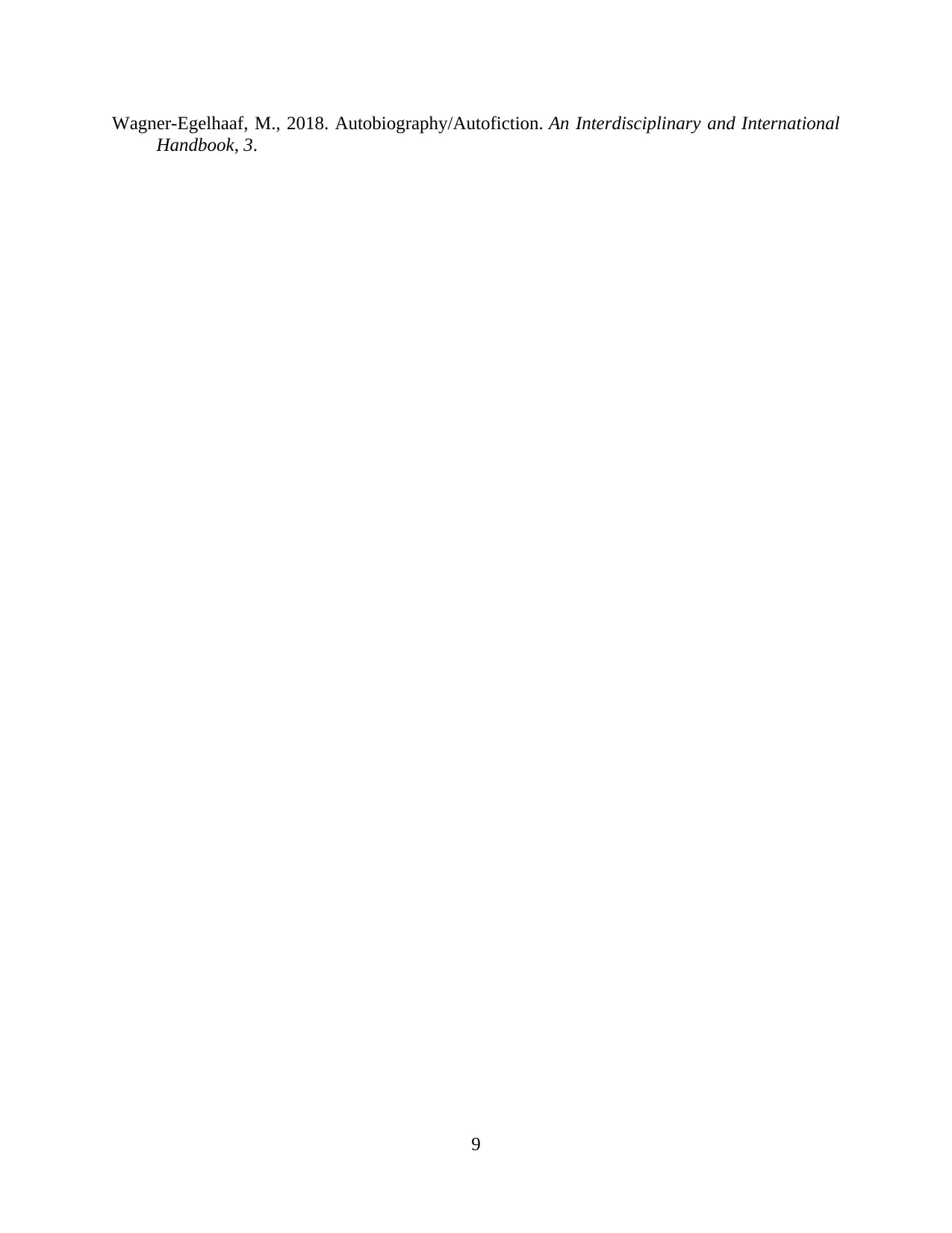
Wagner-Egelhaaf, M., 2018. Autobiography/Autofiction. An Interdisciplinary and International
Handbook, 3.
9
Handbook, 3.
9
1 out of 11
Related Documents
Your All-in-One AI-Powered Toolkit for Academic Success.
+13062052269
info@desklib.com
Available 24*7 on WhatsApp / Email
![[object Object]](/_next/static/media/star-bottom.7253800d.svg)
Unlock your academic potential
© 2024 | Zucol Services PVT LTD | All rights reserved.



